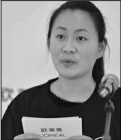
CHINA DAILY
Zhang Zhuo will start a free three-month training in makeup and beauty.
Zhang Zhuo says whenever she attends a friend or relative's wedding, she adores the bride's makeup and dress. Like most girls, she loves beauty. But the junior college student from a poor family in Hongdou village, Shifang city in Sichuan province, could not afford expensive cosmetics. Every morning, she simply paints her lips and eye brows facing a small mirror in her dorm at Polus International College, at suburban Chengdu.
When she saw the notice that China Youth Development Foundation and the French cosmetics company L'Oreal will launch a free three-month training of makeup and beauty care on the campus, she immediately went to apply.
Zhang and 39 other students passed the audition and will start the training in March. The jury-including school officials, representatives from the CYDF and L'Oreal-does not require the applicants to have particular skills in makeup or hairstyling. Instead, they try to find students from poor families, short on financial support but with self-respect, confidence and ambition to lead a decent life.
Zhang, 20, failed the national college entrance examination for a public university three years ago. Her family could not afford to send her to expensive private colleges. But she still wants to learn skills to
make a living in the futures, so she enrolled at the vocational college to learn marketing.
"In a time when marketing students from top universities could not find a decent job easily, it's extremely hard for us in the vocational school. I hope to learn more skills to make myself more competitive in the job market," says Zhang.
"After graduation, I plan to work in beauty salons to learn skills and gain experience for a few years. And then I hope to own my own salon or boutique one day," she says.
L'Oreal started the international "Beauty for a Better Life" program in 2009, aiming to help certain disadvantaged communities regain self-esteem and reintegrate socially through free training programs, including hairstyling, makeup and beauty care. The potential payoff: independence and employment opportunities.
The program has been established in almost 20 countries and benefited more than 1,500 people from Latin America to Asia, through Europe and the Middle East.
In Vietnam, 300 women were trained over three years, helping them become financially independent. In Brazil, out of 130 young people from underprivileged neighborhoods who received training in Sao Paulo and Rio de Janeiro, 70 percent went on to find work.
"We hope the training program could enable society's most vulnerable members to find their place," says Sara Ravella, director of communications, sustainable development and public affairs for L'Oreal and director-general of the L'Oreal Foundation, at the recent ceremony to launch the program in China at Polus International College in Chengdu.
In each country, L'Oreal works with a local partner that is familiar with the country's particular conditions and can identify the right beneficiaries. In China, it works with its long-term partners, the China Youth Development Foundation and the vocational college, which offers makeup and hair-styling courses.
In beauty-related professions, says Polus founder and president Yan Hong, "passion, creativity and imagination take center stage". Those qualities boost self-confidence and motivate people to develop careers.
"Young people are the future and hope of China," says Wang Xudong, vice-secretary-general of the China Youth Development Foundation. "Unfortunately some young people lose the opportunity to complete their studies. In order to improve their employment potential, it is crucial to encourage these youngsters and train them with necessary skills. We hope that 'beauty for a Better Life' will broaden the horizons of young students, and help them to better integrate into society."
While the program in other countries focuses on hairstyle training, China's will be the first to teach makeup and beauty care.
In addition to the 40 students selected from Polus, the foundation will find 60 more young people from other poverty-stricken areas, including Ya'an, the town that suffered a major earthquake in April, to join the program.
We recommend:
